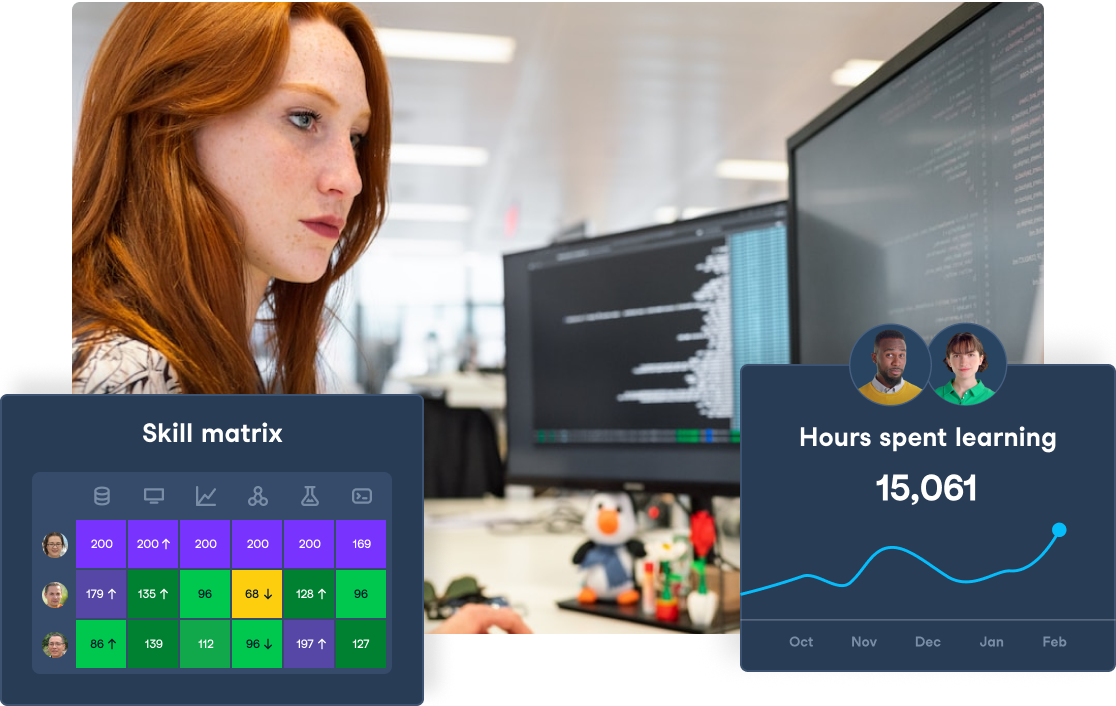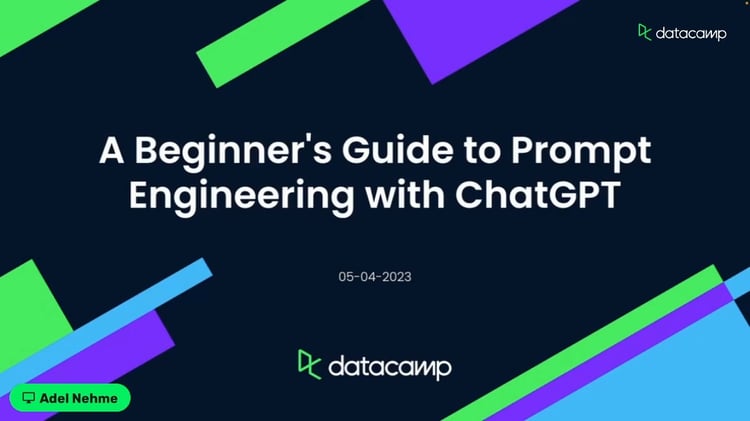Track
Both Perplexity and ChatGPT are powerful AI assistants, and each brings unique capabilities that suit different tasks and working styles. To help you choose, I’ve created a guide so you can better tell the differences between the two and choose the one that best aligns with your specific needs.
If you are looking to learn more about the latest AI tools and need help discerning which things are most worth learning or which tools are worth mastering, DataCamp has resources for both individuals and organizations. For individual learners, we offer our Learn ChatGPT course and the ChatGPT Fundamentals skill track so that you can advance your career; for businesses, we offer a range of enterprise solutions so businesses can upskill entire teams at once.
Elevate Your Organization's AI Skills
Transform your business by empowering your teams with advanced AI skills through DataCamp for Business. Achieve better insights and efficiency.

What is Perplexity?
Perplexity functions as a research-first AI assistant that emphasizes accurate information delivery through real-time web search integration. The platform treats each query as a research task, methodically gathering and presenting information with clear source attribution.
When you ask Perplexity a question, it searches current web sources and synthesizes the information into a comprehensive answer. Each response includes direct citations, allowing users to verify claims and explore source material. This approach makes Perplexity particularly effective for academic research, fact-checking, and understanding complex topics.
The platform's dedication to transparency extends beyond simple citations. Perplexity shows users exactly where information comes from, often presenting multiple perspectives on a topic when available. This helps users form well-rounded understanding of subjects while maintaining confidence in the accuracy of their findings.
What is ChatGPT?
ChatGPT serves as a versatile AI assistant that combines conversational ability with diverse capabilities. ChatGPT’s recent integration of web search adds current information access to its existing strengths in analysis, creativity, and problem-solving.
The platform processes multiple types of input - text, images, and audio - making it adaptable to various tasks. Users can engage in natural conversations while accomplishing specific goals, from writing code to analyzing data. The custom GPT feature allows users to create specialized versions of the assistant tailored to particular tasks or knowledge domains.
ChatGPT's new search capability marks a significant addition to its toolkit. The feature activates automatically when needed or at user request, providing real-time information with source links. Through partnerships with news organizations and data providers, it delivers current information about weather, stocks, sports, and news, integrating these updates seamlessly into conversations.
Key Features of Perplexity and ChatGPT
Search and research capabilities
Both platforms now offer web search integration to provide users with current information and verified sources. However, Perplexity and ChatGPT implement this capability in notably different ways, particularly in how they gather information and present their findings to users.
| Feature | Perplexity | ChatGPT |
|---|---|---|
| Search Integration | Native search built into its core architecture | Recently integrated search capabilities |
| Source Citation | Automatic source citation in every response | Source links provided through a dedicated sidebar |
| Information Retrieval | Real-time information retrieval optimized for research | Optional search activation based on query type |
| Presentation | Structured presentation of findings with clear attribution | Partner integrations with news and data providers |
Conversational abilities
The platforms have developed their own unique methods for engaging with users and processing queries. Perplexity focuses on research-driven exchanges while ChatGPT emphasizes natural conversation flow, leading to distinct differences in how each handles user interactions.
| Feature | Perplexity | ChatGPT |
|---|---|---|
| Response Focus | Focused on direct, information-driven responses | Natural, fluid conversation style |
| Conversation Flow | Structured conversation flow optimized for research | Context-aware responses across multiple turns |
| Source Integration | Clear separation of sources and analysis | Adaptive tone based on user interaction |
| Query Handling | Research-oriented follow-up suggestions | Versatile handling of various query types |
Specialized features
Each platform offers unique tools and capabilities that extend beyond basic search and conversation functions. These specialized features reflect each platform's core focus and shape how users can accomplish different tasks:
| Feature | Perplexity | ChatGPT |
|---|---|---|
| Research Tools | Advanced research tools for academic and professional queries | Custom GPT creation for specialized tasks |
| Data Comparison | Multi-source comparison and analysis | Image and audio processing capabilities |
| Fact-Checking | Automated fact-checking with source verification | Code interpretation and generation |
| Data Visualization | Specialized data visualization for numerical information | Interactive data analysis tools |
ChatGPT Search vs. Perplexity
Both platforms now incorporate web search capabilities into their core functionality, but they serve different user needs. Through partnerships with news organizations and data providers, ChatGPT brings current information into its conversational interface, presenting sources through a dedicated sidebar. The platform automatically determines when to activate search based on user queries, seamlessly blending this information into its responses.
Perplexity takes a research-first approach, with web search integrated into every interaction. The platform weaves citations directly into responses, allowing users to track information to its source while reading. This integration creates a more academic experience, prioritizing source verification and comprehensive research.
For readers interested in exploring ChatGPT's search capabilities in more detail, I recommend taking a look at ChatGPT Search: A Guide With Examples. It covers everything from access methods to specific query types and features.
Pros and Cons of Perplexity vs. ChatGPT
Choosing between these AI assistants often comes down to understanding their relative strengths and limitations. Each platform's advantages and drawbacks reflect their core design philosophies and intended use cases.
Perplexity
When evaluating Perplexity's capabilities, its research-focused design shapes both its strengths and limitations.
| Pros | Cons |
|---|---|
|
|
ChatGPT
ChatGPT's versatility offers broad applications but comes with specific trade-offs in specialized tasks.
| Pros | Cons |
|---|---|
|
|
When to Use Each Tool
Selecting between Perplexity and ChatGPT depends largely on your primary task and preferred working style. Understanding the ideal use cases for each platform helps maximize their potential benefits.
Perplexity
Perplexity excels in situations where accuracy and source verification are top priorities. The platform's research-first approach makes it particularly valuable for academic and professional work.
Best suited for:
- Academic research requiring cited sources
- Fact-checking current events and claims
- Deep analysis of complex topics
- Creating content that needs source attribution
- Market and industry research
- Comparing multiple perspectives on a topic
ChatGPT
ChatGPT shines in scenarios that benefit from its flexible, conversational approach and diverse capabilities. Its ability to switch between tasks while maintaining context makes it valuable for varied work sessions.
Best suited for:
- Creative writing and content generation
- Programming assistance and debugging
- Problem-solving across different domains
- Brainstorming and ideation
- Educational explanations and tutorials
- Processing and analyzing images and audio
Final Thoughts
For research-intensive tasks that require clear source attribution, Perplexity provides a more streamlined experience. Its consistent focus on verification and citation makes it an excellent choice for academic work, fact-checking, and professional research.
ChatGPT's broader capabilities and natural conversation style make it well-suited for users who need a versatile assistant. Its recent addition of search features, combined with multimodal support and custom GPTs, creates a flexible tool for various creative and technical tasks.
Rather than viewing these platforms as competitors, users might benefit from understanding them as complementary tools. Perplexity's research strength pairs well with ChatGPT's versatility, allowing users to choose the right tool based on their current needs.
As organizations adopt these AI assistants, structured training becomes essential for effective implementation. DataCamp supports this transition through enterprise solutions that include customized learning paths and detailed analytics, helping teams develop proficiency with both platforms while maintaining organizational best practices.
Elevate Your Organization's AI Skills
Transform your business by empowering your teams with advanced AI skills through DataCamp for Business. Achieve better insights and efficiency.

Finally, I suggest tuning in to the DataFramed podcast, which is a great way to stay current with the latest AI developments. DataFramed always gets lots of great guests, such as the Co-Founder and CTO of none other than Perplexity itself. Check out Perplexity & the Future of AI with Denis Yarats and subscribe to DataFramed.
Subscribe to DataFramed
Subscribe to DataFramed wherever you get your podcasts.

As an adept professional in Data Science, Machine Learning, and Generative AI, Vinod dedicates himself to sharing knowledge and empowering aspiring data scientists to succeed in this dynamic field.
Questions About Perplexity and ChatGPT
Can I use both Perplexity and ChatGPT together?
Yes, many users benefit from using both platforms as complementary tools. Perplexity can be used for research-heavy tasks requiring citations, while ChatGPT can handle creative work and technical problems.
Which AI assistant is better for creative writing?
ChatGPT is the stronger choice for creative writing due to its more natural conversational style and versatile approach to content generation. Its ability to maintain context and adapt tone makes it particularly well-suited for creative tasks.
Does Perplexity provide real-time information?
Yes, Perplexity offers real-time information retrieval with every query and automatically includes source citations. Each response includes current information from the web with clear attribution to help users verify the accuracy.
Can ChatGPT search the internet now?
Yes, ChatGPT now has web search capabilities through partnerships with news organizations and data providers. The search feature activates automatically when needed or can be manually requested by users.
Which AI assistant is better for coding help?
ChatGPT is generally better for programming assistance due to its strong code interpretation and generation capabilities. It can help with debugging, explain coding concepts, and provide interactive support across multiple programming languages.


